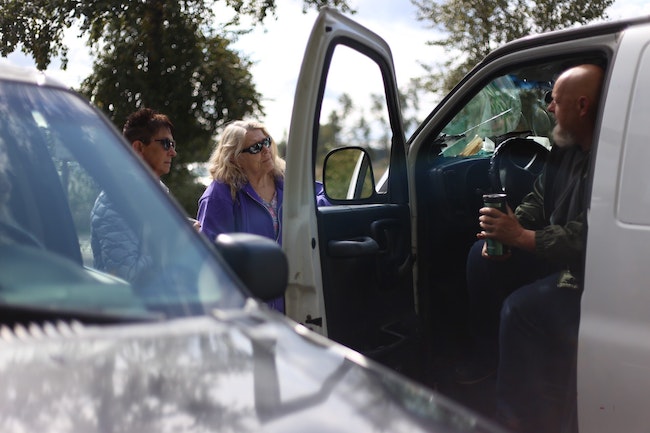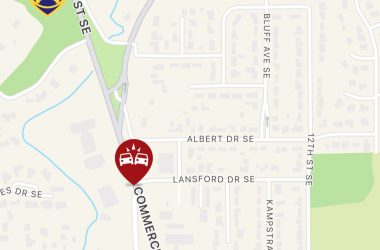 Volunteers with The ARCHES Project, Pamela Watson, left, and Lorrie Walker, talk with homeless resident Doug Pendleton at Cascades Gateway Park in September. Pendleton lived in his car at the park until it was swept. (Troy Brynelson/Salem Reporter)
Volunteers with The ARCHES Project, Pamela Watson, left, and Lorrie Walker, talk with homeless resident Doug Pendleton at Cascades Gateway Park in September. Pendleton lived in his car at the park until it was swept. (Troy Brynelson/Salem Reporter)
As city of Salem staff hunt for a place where homeless residents may legally set up tents, staff may also soon look for a place for cars, too.
Councilor Chris Hoy on Monday plans to ask staff to report back on how Salem can organize a place to camp for people who live in their vehicles. A draft of Hoy’s motion can be viewed online.
“Currently, many Salem residents experiencing homelessness live out of their cars or recreational vehicles,” the motion said. “There are few legal options for these residents to locate and maintain their vehicle for any period of time.”
Camping in cars also may impact neighborhoods and businesses, the motion said, with litter and the “unintended use of right-of-way as living space.”
The motion is another attempt in recent weeks by Salem officials to designate a place for homeless residents to spend the night.
This past Monday, Salem City Council set in motion a two-week plan to ban tents and other dwellings from camping on sidewalks, except for a to-be-determined campground. Staff is expected to deliver on Dec. 9 a report on where that campground may be. The camping ban goes into effect a week later, Dec. 16.
While that plan may be welcomed by people living in tents, Hoy said it may not help people living in their cars who are also homeless.
“I know this will be a fairly small impact, but I think it would be a meaningful impact for some people,” he said.
There is no explicit timetable for this latest report to be finished, however.
It’s unclear how many people in Marion and Polk counties live in cars, trucks or RVs. The annual headcount of homeless residents in January found about 1,100 unsheltered individuals, according to the state. But it’s hard to distinguish how many live in their vehicles, said local homeless services providers.
“They’re the most difficult” to track, said Stephen Goins, director of transitional programs for Northwest Human Services. “A lot of the folks in cars are also working. They’re making just enough to pay medical bills, keep their car on the road, but they don’t make enough to get into a place.”
Unlike the potential campground for tents, Hoy’s motion doesn’t ask staff to find city-owned property for the cars to park. Instead he said other organizations, such as those with parking lots unused at night, may be willing to help.
That’s part of the point of the report, he added, to find out what might work.
“I just want them to look at ‘What are the best practices?’” Hoy said. “Let’s learn from those, pick the best and go for it.”
Eugene has a program already in place. The city will pay the nonprofit St. Vincent de Paul $163,000 this year to oversee businesses and churches that offer between one and three parking spaces for the night, according to Eugene city staff.
The program started in the 1990s, but today there are 53 sites offering more than 70 spaces total. People who use the spaces are typically waiting for housing, said Regan Watjus, policy analyst in the City Manager’s Office in Eugene. The waitlist is constantly full.
“We have a much greater need than we’re able to fulfill,” she said. “And the city of Eugene and our community are working to make the program more effective at helping people access housing.”
It’s unclear how problematic illegal car camping is for law enforcement in Salem. In late summer, the Salem Police Department spurred cars from Cascades Gateway Park where many had regularly slept. The city’s Parks and Recreation Department followed soon after, blocking vehicle access with bollards and boulders.
Salem police spokeswoman Lt. Debbie Aguilar on Thursday said lately there aren’t really any major places where that activity’s going on.
“I can’t say that we have many areas in town where we’re finding that,” she said.
Have a tip? Contact reporter Troy Brynelson at 503-575-9930, [email protected] or @TroyWB.
RELATED COVERAGE:
Police tactics toward homeless under fire as Salem considers new ordinance (Sept. 22)
City cuts back more access to Cascades Gateway Park (Sept. 25)
Salem bans open camping and now seeks a place to host it (Dec. 3)









